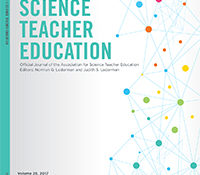eric.ed.gov har udgivet: The 1989 Charlottesville Education Summit of the nation’s governors resulted in the National Education Goals which describe six priorities (readiness for school; high school completion; student achievement; world leadership in science and math; adult literacy; and safe, disciplined, and drug free schools) for public schools to achieve by the year 2000. As originally written, the goals did not include a distinct role for higher education nor did they acknowledge the importance of teachers to their success. Policy makers have begun to address the omission and have proposed an additional goal that calls for teachers to “have access to programs for the continued improvement of professional skills.” This digest highlights initiatives taken by the teacher education community in support of achieving the goals. For example, the American Association… Continue Reading →
Like this:
Like Loading...
tandfonline.com har udgivet en rapport under søgningen “Teacher Education Mathematics”: ABSTRACT ABSTRACT Effective professional development programs (PDPs) rely on well-defined goals. However, recent studies on PDPs have not explored the goals from a multi-stakeholder perspective. This study identifies the most important learning goals of PDPs at science research institutions as perceived by four groups of stakeholders, namely teachers, education researchers, government representatives, and research scientists. Altogether, over 100 stakeholders from 42 countries involved in PDPs at science research institutions in Europe and North America participated in a three-round Delphi study. In the first round, the stakeholders provided their opinions on what they thought the learning goals of PDPs should be through an open-ended questionnaire. In the second and third rounds, the stakeholders assessed the importance of the learning goals that… Continue Reading →
Like this:
Like Loading...
eric.ed.gov har udgivet: The information in this volume was compiled in order to provide a guide to the technology-in-education programs of the federal government. The goal of this book is to provide important information about technological resources that will assist teachers, administrators, students, parents and others in achieving the goal of the United States being first in the world in math and science. Included are descriptions of technology-in-education programs in some offices and entities of the federal government, such as the Office of Technology Policy, Office of Bilingual Education and Minority Language Affairs, Office of Elementary and Secondary Education, Office of Educational Research and Improvement, Office of Postsecondary Education, Department of Agriculture, Department of Commerce, Department of Defense, Department of Energy, General Services Administration, Department of Health and Human Services,… Continue Reading →
Like this:
Like Loading...
tandfonline.com har udgivet en rapport under søgningen “Teacher Education Mathematics”: Abstract Formulae display:?Mathematical formulae have been encoded as MathML and are displayed in this HTML version using MathJax in order to improve their display. Uncheck the box to turn MathJax off. This feature requires Javascript. Click on a formula to zoom. Abstract It is often assumed that students’ personal achievement goals are most beneficial when they match the goal structures of the classroom, but interaction between achievement goals and goal structures is not well researched. In this study, we aim at providing a nuanced picture of the direct, interaction, and nonlinear effects of achievement goals and goal structures on test performance and autonomous motivation. We used multiple linear regressions, including interaction and quadratic terms, in combination with response surface methodology… Continue Reading →
Like this:
Like Loading...
eric.ed.gov har udgivet: [Slides] presented at the annual conference of the National Council of Supervisors of Math. Link til kilde
Like this:
Like Loading...
tandfonline.com har udgivet en rapport under søgningen “Teacher Education Mathematics”: ABSTRACT ABSTRACT The study investigated changes in teaching practices and classroom processes, seen from a student perspective, before and after the education reforms of the 1990s, and the introduction of the Swedish 1994 National Curriculum for comprehensive school. The total time pass stretches from 1980 to 2014. The focus is on comparisons of results based on identical statements in questionnaires, given to six nationally representative student cohorts within the ongoing Evaluation Through Follow-up project, who attended grade 6 or grade 9. The findings show the working atmosphere in the Swedish grade-6 schools to have improved during the 1980s, pointing also to changes in the teacher role. Teacher-led class teaching was in less use than in previous decades, but still the… Continue Reading →
Like this:
Like Loading...
eric.ed.gov har udgivet: This monograph offers an overview of the current research work carried out in Croatia and the surrounding countries, and specifically an interesting insight in teaching and learning issues in these countries. The authors discuss the need of the general population for becoming good problem-solvers in society of today, which is characterised by rapid technological changes and economic development. They argue that modern teaching methods are therefore needed. From the contributions in this monograph, it appears that awareness of future teachers’ beliefs and knowledge is present in the tertiary education. The studies investigate various aspects of pre-service and in-service teachers’ characteristics, like beliefs, knowledge, digital competencies or using ICT in teaching. But the contributions also portray another picture: mathematics education is becoming accepted as a field of scientific… Continue Reading →
Like this:
Like Loading...
eric.ed.gov har udgivet: This paper reports findings of a pilot study examining the feasibility of a research design to investigate how achievement goals relate to the construct of math anxiety. In addition, we also consider how other important achievement-related behaviors, like self-efficacy, help-seeking, and self-regulation, might also relate to students’ math anxiety. While math anxiety still remains a real issue affecting student performance and confidence, today it is more critical in our society with the greater emphasis on producing more students for careers in fields like Science, Technology, Engineering, and Mathematics (STEM). The total multiple regression model predicted a significant amount (43%) of the variation in math anxiety of participants. Link til kilde
Like this:
Like Loading...
eric.ed.gov har udgivet: This resource is part of a series produced by the Center for Standards and Assessment Implementation (CSAI) to assist teachers and those who support teachers to plan teaching and learning from College and Career Ready Standards (CCRS) for all students, including students with disabilities, English learners, academically at-risk students, students living in extreme poverty, and gifted/talented students. The series of resources addresses key shifts in learning and teaching represented in the CCRS. This resource uses the Common Core State Standards (CCSS; National Governors Association Center for Best Practices, Council of Chief State School Officers, 2010) as an example of CCRS. The processes described in this resource are applicable to all States’ CCRS, including the CCSS. The content of this resource is drawn from leading theory and research… Continue Reading →
Like this:
Like Loading...
eric.ed.gov har udgivet: This paper presents partial results of a completed study which investigated the experience of teaching mathematics content courses to preservice elementary teachers. Interviews with ten mathematics instructors who teach these courses revealed several major tensions, including one that arises as instructors strive to set priorities and balance their affective and cognitive goals for their students. An analysis of three of the instructors’ experiences of this particular tension will provide insight into the factors that contribute to it and how it is managed. [For the complete proceedings, see ED584829.] Link til kilde
Like this:
Like Loading...


